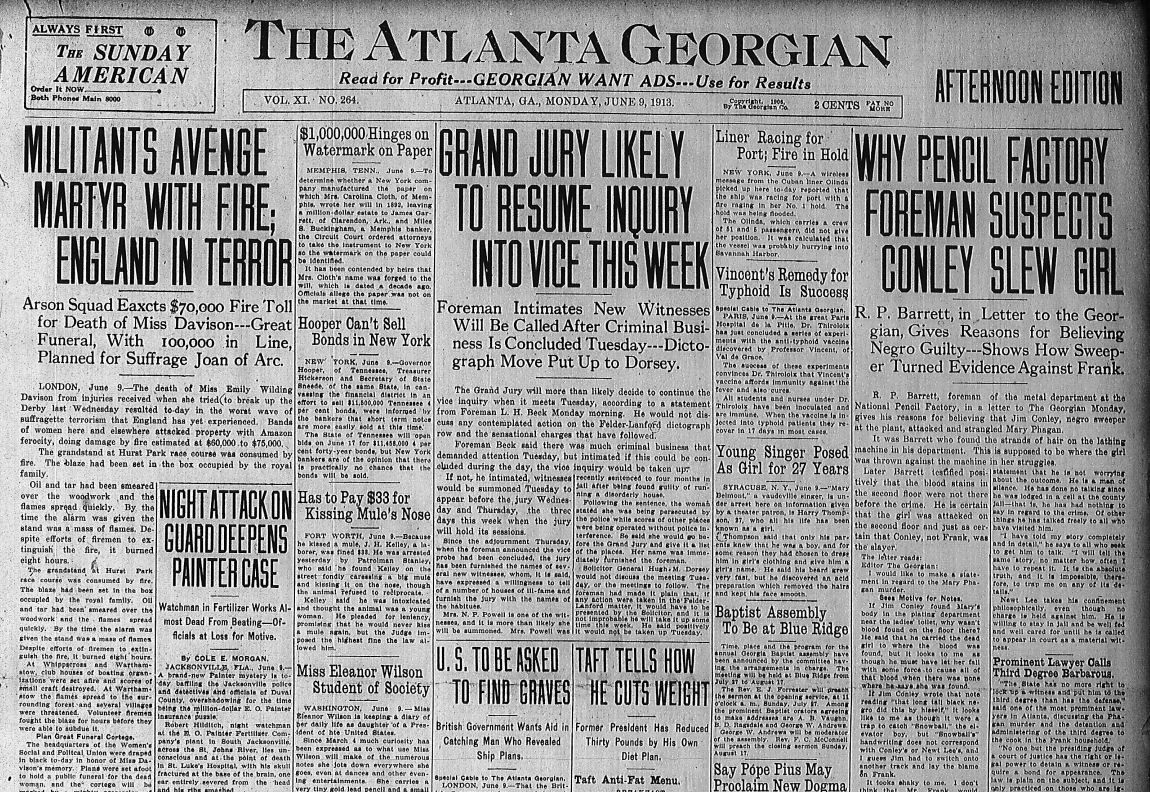Foreman Tells Why He Holds Conley Guilty
Atlanta Georgian
Monday, June 9th, 1913
R. P. Barrett, in Letter to Georgian, Gives Reasons for Suspecting Negro of Crime.
R. P. Barrett, foreman of the metal department at the National Pencil Factory, in a letter to The Georgian Monday, gives his reasons for believing that Jim Conley, negro sweeper at the plant, attacked and strangled Mary Phagan.
It was Barrett who found the strands of hair on the lathing machine in his department. This is supposed to be where the girl was thrown against the machine in her struggles.
Later Barrett testified positively that the blood stains in the second floor were not there before the crime. He is certain that the girl was attacked on the second floor and just as certain that Conley, not Frank was the slayer.
The letter reads:
Editor The Georgian:
I would like to make a statement in regard to the Mary Phagan murder.
Sees Motive for Notes.
If Jim Conley found Mary’s body in the plating department near the ladies’ toilet, why wasn’t blood found on the floor there? He said that he carried the dead girl to where the blood was found, but it looks to me as though he must have let her fall with some force to cause all of that blood when there was none where he says she was found.
If Jim Conley wrote that note reading “that long tall black negro did this by hisself,” it looks like to me as though it were a trap to catch “Snowball,” the elevator boy, but “Snowball’s” handwriting does not correspond with Conley’s or Newt Lee’s, and I guess Jim had to switch onto another track and lay the blame on Frank.
It looks shaky to me. I don’t think that Mr. Frank would stand at the head of the stairs and let Jim holler, “Come on and help me; she is too heavy.” Nor do I think that Mr. Frank would carry the dead girl to the elevator when there were people working on the top floor who might come down at any minute and see him carrying the body. It seems to me that if Mr. Frank committed the murder of Mary Phagan, he would have left her body in the metal department. No, Jim carried her to the basement, where the night watchman found the body, and I will tell you how he found it.
Why Did He Go to Basement?
He went from the second floor down one flight of stairs, then crawled through the scuttle hole, about 2 1-2 feet square, and went down the ladder into the basement. Then he walked about 125 feet to the dingy toilet and he saw the body about 20 feet from there, for there is a toilet on every floor. There is no clock in the basement to punch and Lee had no fire to make in the boiler, it being Sunday morning. Why at this particular time did he go to this part of the basement?
Why did Jim Conley come down to the metal department the day that he was arrested? He came down to wash his shirt. Why didn’t he do that on some other floor? He knows that he came in our department to watch and see if they had found Mary’s hat and shoe. He probably knew that they had not found her money, for money is not a good thing to lay around.
Frank is Optimistic.
Leo M. Frank maintained his cheerful and optimistic attitude during the visits of many of his friends and relatives Sunday and Monday. Thirty persons were admitted to the Tower to see him on the Sabbath. Among them was Mrs. Frank, with whom he dined in the afternoon.
He had little to say to any of his visitors directly in regard to the charges which have been made against him. He declared, however, that he was awaiting his trial with every expectation of receiving complete vindication. He said that he believed not only that his own innocence would be proved, but that the guilt would be fixed upon the real author of the crime.
Frank’s appearance beats out his statement that he is not worrying about the outcome. He is a man of silence. He has done no talking since he was lodged in a cell at the county jail—that is, he has had nothing to say in regard to the crime. Of other things he has talked freely to all who have visited him.
“I have told my story completely and in detail,” he says to all who seek to get him to talk. “I will tell the same story, no matter how often I have to repeat it. It is the absolute truth, and it is impossible, therefore, to trap me on any of its details.”
Newt Lee takes his confinement philosophically, even though no charge is held against him. He is willing to stay in jail and be well fed and well cared for until he is called to appear in court as a material witness.

